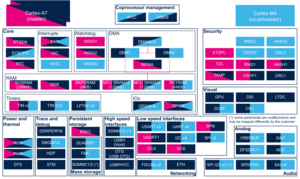1 Article purpose[edit source]
The purpose of this article is to:
- briefly introduce the TSGEN peripheral and its main features,
- indicate the peripheral instances assignment at boot time and their assignment at runtime (including whether instances can be allocated to secure contexts),
- list the software frameworks and drivers managing the peripheral,
- explain how to configure the peripheral.
2 Peripheral overview[edit source]
The TSGEN peripheral generates a universal reference in time, named timestamps, and sends it to the CoreSight™ source peripherals (such as STM and ETM internal peripherals). Source peripherals use then this reference to integrate it in the generated trace. Since multiple trace generators can be implemented in a CoreSight system, the timestamp allows traces to be ordered chronologically.
Refer to the STM32MP15 reference manuals for the complete list of features, and to the software frameworks and drivers, introduced below, to see which features are implemented.
3 Peripheral usage[edit source]
This chapter is applicable in the scope of the OpenSTLinux BSP running on the Arm® Cortex®-A processor(s), and the STM32CubeMPU Package running on the Arm® Cortex®-M processor.
3.1 Boot time assignment[edit source]
3.1.1 On STM32MP15x lines  [edit source]
[edit source]
The TSGEN can be used at boot time to provide time stamping for ETM and STM traces.
3.2 Runtime assignment[edit source]
3.2.1 On STM32MP15x lines  [edit source]
[edit source]
Click on the right to expand the legend...
Check boxes illustrate the possible peripheral allocations supported by STM32 MPU Embedded Software:
- ☐ means that the peripheral can be assigned to the given runtime context.
- ☑ means that the peripheral is assigned by default to the given runtime context and that the peripheral is mandatory for the STM32 MPU Embedded Software distribution.
- ⬚ means that the peripheral can be assigned to the given runtime context, but this configuration is not supported in STM32 MPU Embedded Software distribution.
- ✓ is used for system peripherals that cannot be unchecked because they are hardware connected in the device.
Refer to How to assign an internal peripheral to an execution context for more information on how to assign peripherals manually or via STM32CubeMX.
The present chapter describes STMicroelectronics recommendations or choice of implementation. Additional possiblities might be described in STM32MP15 reference manuals.
| Domain | Peripheral | Runtime allocation | Comment | |||
|---|---|---|---|---|---|---|
| Instance | Cortex-A7 secure (OP-TEE) |
Cortex-A7 non-secure (Linux) |
Cortex-M4 (STM32Cube) | |||
| Trace & Debug | TSGEN | TSGEN | No assignment possible | |||
4 Software frameworks and drivers[edit source]
The TSGEN can be used at run time to provide time stamping for ETM and STM traces. There is no software dedicated to the TSGEN internal peripheral delivered with STM32MPU ecosystem.
5 How to assign and configure the peripheral[edit source]
Configuration of the TSGEN is done via JTAG scripts. Those scripts must be built by the user thanks to STM32MP15 reference manuals .
